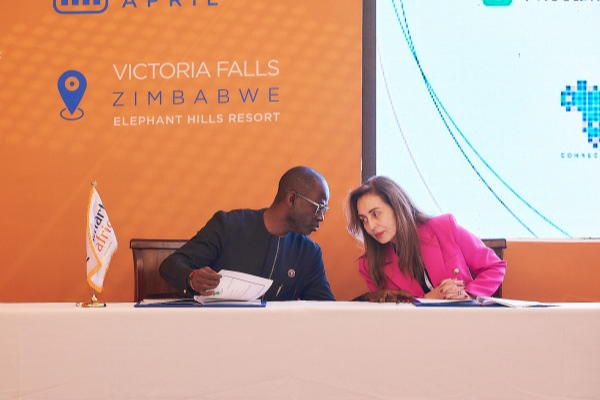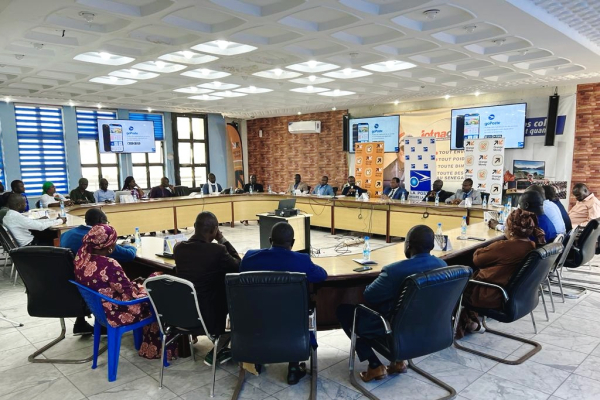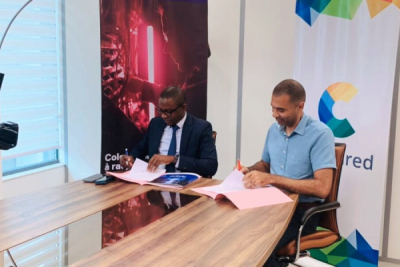
News (1792)
E-commerce is often touted as the way of the future in Africa. The sector has grown exponentially in recent years and the International Finance Corporation (IFC) expects it to grow further in the coming years.
Last Tuesday, the African Development Fund (ADF) -the concessional window of the African Development Bank (AfDB)- and the Smart Africa Alliance announced a Memorandum of Understanding (MoU) to launch the Multinational - Institutional Support for Digital Payments and e-Commerce Policies for Cross-Border Trade (IDECT), which aims to streamline digital payments and e-commerce policies in ten African countries.
The MoU was signed in Zimbabwe by Lacina Koné (photo, left), the CEO of Smart Africa, and Leïla Mokaddem, Director General of the African Development Bank for Southern Africa on the sidelines of the 6th Transform Africa Summit (TAS), which runs until Friday, April 28, in Victoria Falls.
"This initiative will support the development of harmonized e-payment policies, capacity building, and gender-responsive frameworks, ultimately fostering a digital business ecosystem that generates employment opportunities across the continent," Leïla Mokaddem said.
According to the AfDB, IDECT will assess policy gaps in the digital trade and e-commerce ecosystems of Côte d'Ivoire, Benin, Ghana, Liberia, Uganda, South Sudan, Zimbabwe, Republic of Congo, São Tomé and Príncipe, and the Democratic Republic of Congo.
The 3-year project will be executed by the Smart Africa Alliance from Kigali (Rwanda) and jointly funded by the African Development Fund and Smart Africa.
Ultimately, IDECT's programs are expected to reach 600 participants, 60% of whom will be women and youth. In addition, a certified online training program will be designed for 2,500 participants, 60 percent of whom will be women. This program will be gender sensitive and address the specific challenges faced by women in the fields of e-commerce and digital business.
Samira Njoya
Senegal wants to recapitalize its postal company to save it from its ongoing problems. One of the main solutions considered for this restructuring bid is service digitization.
Last Tuesday, Senegal’s public postal operator La Poste and mobile money company Orange Finances Mobiles Senegal signed a partnership agreement to implement innovative projects.
On its Twitter account, La Poste indicates that the agreement focuses on customer management with innovative and inclusive tools as formulated in its strategic expansion plan PSE-La Poste.
A few months ago, Senegal decided to restructure its postal company and revive its activities. For that purpose, sectoral actors elaborated a strategic expansion plan aimed at transforming the public postal company, modernizing its sorting and hybrid mailing center, setting up a modern customer relations center, improving existing processes, products, and services, and introducing innovative services.
To successfully implement the expansion plan, La Poste joined forces with choice partners, including Orange Finances Mobiles and Ecobank.
Under the new partnership, La Poste will benefit from Orange’s experience in the development of innovative services and products. Meanwhile, Orange will capitalize on the postal operator’s assets and advantages, such as its proximity to the population and its extended network that allows it to be a reliable partner in the rapidly changing mobile money industry.
Samira Njoya
Low Internet penetration and growing demand for broadband have attracted many international and local investors to the Democratic Republic of Congo. To meet the population’s demand, companies are joining forces to develop common strategies.
Last Friday, tech company CSquared and data center management operator Raxio signed a memorandum of understanding to improve Internet connectivity in the Democratic Republic of Congo.
Yannick Sukakumu (photo, left), Raxio's general manager in the DRC, says the MOU provides the missing piece for Raxio to serve its customers in the country. It will allow CSquared DRC to connect the various Raxio data centers to offer quality internet to clients.
The partnership is part of Raxio's ambition to deploy several data centers to host IT equipment, and critical communication infrastructures, among others. For CSquared, this collaboration is part of a coherent strategy to expand its footprint across Africa in a context marked by high demand for broadband connectivity on the continent.
"By building infrastructure such as fiber optics and data centers and connecting them with existing technology solutions and services, we believe we are building an ecosystem” that will support the creativity of our youth, which is in dire need of such support, said Alain Malanda (photo, right), manager of CSquared DRC.
Samira Njoya
The African video game market is currently growing steadily with a rising number of gaming communities being built on the continent. It is therefore important to create a framework to develop the sector and train future professional gamers on the continent.
On April 19, 2023, in Dakar, the Senegalese eSport promotion committee CONAPES and Senegal Digital (SENUM SA) signed a partnership agreement to promote eSport in the country. The agreement aims to allow access to digital development centers (ESS) for gamers.
On Twitter, CONAPES explains that the partnership is an opportunity to democratize eSport, but also an opportunity to offer training in professions related to gaming, in line with the digital inclusion so desired by and for the Senegalese youth.
Under the agreement, SENUM SA and CONAPES will build a network of 45 ESSs dedicated only to gaming. Therefore, gamers will access the resources available to all the ESSs present in the 14 regions, including 6,000 kilometers of fiber optic cable offering very high-speed internet. The main objective is to create 45 eSport Clubs (Pro Gamer), 45 eLeagues, and a national eSport competition, namely the Senum Esport Competition (SECO).
The partnership will also give CONAPES staff access to a vast training and mentoring program on professions related to electronic games, immersive sports, cybersports, techsport, and phygital sports including innovative technologies, artificial intelligence, drones, and exoskeletons...
For CONAPES, with such an agreement, Senegal becomes the first African country to launch a LAN network dedicated to competitive gaming.
Samira Njoya
Over the past five years, financial support for African technology startups has increased. Confidence in local innovators continues to grow and attract investors who are aware of the opportunities in the African digital economy.
Launch Africa is one of the most active investors in the African startup ecosystem, according to Africa: The Big Deal. Since launching operations in mid-2020, the pan-African venture capital fund has invested more than $31 million in 133 deals, averaging more than one deal per week. The check size of most of its deals ranges between $100,000 and $300,000, with a median check of $250,000.
So far, it has focused on 22 countries. Startups in four countries in particular Nigeria, South Africa, Kenya, and Egypt have alone attracted $21 million of its overall investments (in 89 deals).
Five other markets have attracted more than $1 million. They are namely Ghana, Senegal, and Côte d’Ivoire (in West Africa) as well as Tanzania and Tunisia. The investment team also went off the beaten path by identifying investments in often overlooked countries such as Togo, Sudan, and Angola.
Fintech was the sector in which Launch Africa invested the most with 42 deals (32%) valued at $11 million (36% of its overall investments) across 13 markets. In Nigeria, fintech attracted 13 deals.
Other sectors that attracted heavy Launch Africa’s investments were marketplaces, logistics, big data, and healthtech, each of which attracted between $3 million to $4 million in 15 to 20 deals. Transactions in marketplaces, logistics, and big data were made in about 10 markets. On the other hand, support for healthtech focused on 5 markets, with 7 transactions in South Africa.
Muriel Edjo
Due to the lack of confidence in its currency, Zimbabwe has decided to introduce a digital currency backed by gold. The currency is expected to let citizens store value and protect themselves from exchange rate volatility.
Zimbabwe will soon launch a gold-backed digital currency in an attempt to stabilize its fiat currency, whose continued depreciation against the U.S. dollar is strangling the economy, local media outlet The Sunday Mail reported last Sunday, citing Central Bank Governor John Mangudya (photo).
According to the media outlet, the central bank governor explained that the planned currency would enable people with tiny quantities of Zimbabwean dollars to trade their money for digital tokens to preserve value and hedge against currency fluctuation.
He said the current high volatility in the exchange rate is linked to expectations of an increase in the supply of foreign currency in the market, with the start of the tobacco auction season. Indeed, the Tobacco Industry and Marketing Board (TIMB) announced on March 8 that national tobacco production is expected to increase by 8.5% in 2023 to 230 million kg, thanks to good weather conditions and an increase in planted area.
Zimbabwe is facing a severe economic crisis since the early 2000s after former President Robert Mugabe's land reform broke up a key sector of the country's economy and forced it to stop repaying nearly $13 billion in debts to the World Bank, the African Development Bank (AfDB), the European Investment Bank (EIB) and Paris Club member countries.
The expropriation of white farmers discouraged foreign investment and led to a sharp drop in exports, prompting the Mugabe regime to start printing large amounts of money, leading to a long period of hyperinflation. Against this backdrop, the government was forced to abandon the Zimbabwean dollar in favor of the U.S. dollar in 2009. The Zimbabwean dollar was then reintroduced in 2019 in an attempt to revive the stagnant economy, but it has since continued to depreciate against the greenback.
Confidence in the Zimbabwean currency has been low since people saw their savings wiped out by hyperinflation that reached 5 billion percent in 2008, according to the IMF. Most Zimbabweans prefer buying U.S. dollars on the black market to keep them as savings.
Partnerships between African countries are essential to stimulate economic growth, create jobs and let the continent successfully implement its digital plans. The agreement between Rwanda and Guinea falls in line with those goals.
Last Tuesday, Rwanda and the Republic of Guinea signed a memorandum of understanding for digital cooperation.
According to Mory Sanda Kouyaté (photo, right), Guinean Minister of Foreign Affairs, the memorandum covers cooperation in ICT, posts and telecommunications, digitization, and e-governance.
For several years now, Rwanda has made digital technology a pillar of development. To achieve its goals, the country launched in 2017, a National Transformation Strategy aimed primarily at providing quality services and care in the public and private sectors by 2024.
Guinea, for its part, has also launched digital projects to make life easier for its citizens. The transitional government recently launched an institutional reform program to equip the country with new systems and reliable policies adapted to the needs of its population.
With that bilateral agreement, the two countries will contribute their experience to further develop their respective ICT sectors and position themselves in East and West African digital markets.
By establishing a digital identification system, the Rwandan government plans to address the challenges faced by citizens who have no identity documents when accessing essential services.
The Rwandan parliament recently approved the revision of a bill governing registration in the national single digital identity system.
The draft law presented on Thursday, April 20, by ICT Minister Paula Ingabire, aims to give the government the required approvals to issue digital identity cards to stateless Rwandans and newborns.
“The enactment of the new law relating to enrollment into a single digital identity system will enable the country to close the existing gap in the current population identification system to a more advanced, effective, and efficient delivery of services in both private and public sectors,” said Paula Ingabire.
The project aims to establish a new digital identity card for Rwandans living within or outside the country. It will consist of a physical copy embedded with a QR code containing the holder’s biometric information, as well as a digital copy.
According to Minister Ingabire, the digital identification project will be implemented, over three years, by the National Identification Agency (NIDA) with funding from the World Bank ($40 million).
If passed, the new law will end the problems faced by stateless and other undocumented persons in the country. It will also solve the problem of scattered, contradictory data in the various databases of different institutions, recorded on paper.
For the ICT Minister, this project will be a catalyst for the development of a strong digital economy and a strong digital service delivery ecosystem that will improve productivity, income, and social welfare.
Samira Njoya
This acquisition comes months after Autochek bought the car sales platform CoinAfrique, in Q3-2022.
Nigerian car financing provider Autochek announced, Monday, the acquisition of majority shareholding in Egyptian car dealer AutoTager.
According to the company's statement, the acquisition aims to strengthen Autochek's presence in North Africa and support the company's continued growth.
Commenting on the transaction, Olajide Adamolekun, group CFO and co-founder of Autochek said: “Amr’s -ed. note: Amr Rezk founder of AutoTager- background and track record are as impressive as it gets and I am delighted to have him on board. His experience will be invaluable as we enter the Egyptian market and continue on our mission to improve the automotive finance value proposition on the continent and catalyze more growth across the automotive ecosystem.”
Autochek launched the acquisition of automotive platforms a while ago. In July 2022, the car financing company acquired CoinAfrique. In September 2021, it acquired Cheki Kenya and Cheki Uganda.
With this majority shareholding acquisition, the company now has a presence in nine countries in East Africa, West Africa, and North Africa, with more than 2,000 partner-run dealerships and workshops, according to its release.
By targeting AutoTanger, Autochek is aiming at North African markets, mainly Egypt - which is the third largest economy in Africa according to the African Development Bank (AfDB), and the third largest automotive market on the continent (according to 2021 data from the International Organization of Motor Vehicle Manufacturers-OICA).
Samira Njoya
They are among the 18 finalists nominated out of hundreds of applications received by JFD, a network of women entrepreneurs. They were nominated in the Entrepreneur, Intrapreneur, and Junior categories in Africa.
On Monday, April 17, the women entrepreneurs’ network Journée de la Femme Digitale (JFD) unveiled the list of the winners of the 2023 edition of its “Les Margaret Awards.”
Of the 18 finalists in the three categories of the competition, three were African entrepreneurs. In the “Margaret Entrepreneur Europe & Africa” category, Cameroonian entrepreneur Nelly Chatué-Diop (co-founder & CEO of EJARA) was one of the two winners.
Ghanaian-born Rhoda Oduro, the Business Development & Operations Manager of Developers in Vogue, was one of the two winners in the “ Margaret Intrapreneur Europe & Africa” category.
In the Junior category, Melissa Djouka, another 17-year-old Cameroonian, won the award for the African region, thanks to her project Immo'Sure, a platform aimed at securing the real estate market and protecting its actors in Africa.
For one year, the winners will receive unique and exclusive opportunities to support and accelerate the development of their projects. They will be mentored by companies like La Poste, Google, Axa France, and Universal Music France. They will also receive support from some of the world's largest accelerators, such as the Transatlantic Fund of the French Chamber of Commerce and Industry in Canada.
For the African winners, CIO Mag, Affectio Mutandi, and Gabon 24 will offer targeted training worth €20,000. Africa Mutandi will also allow them access to its investors' network.
"For more than 10 years, we have been working with our partners to accelerate the growth of the Margarets and to reveal the economic and social potential of these future leaders to as many people as possible. This year, we are taking a new step by opening up completely new financing and outreach opportunities for them, " said Delphine Remy-Boutang, founder of JFD & Business Angel.
As a reminder, the Margaret Award was launched in 2013 by JFD. Each year, it rewards African and European women entrepreneurs and intrapreneurs whose projects and innovations address major societal challenges. The award honors Margaret Hamilton, former director of the software engineering department at the MIT Instrumentation Laboratory that developed the embedded software for NASA's Apollo space program.
Samira Njoya
More...
The labor market is undergoing a profound transformation as digital technologies keep growing. While many jobs are disappearing, more are being created and their requirements are changing. In that context, the government needs to urgently take appropriate measures to anticipate and find solutions to help fill the vacancies that are opening.
South Africa will soon launch a nationwide training program to equip the unemployed youth with digital skills, President Cyril Ramaphosa (photo) recently announced. In his weekly newsletter published on Sunday, April 17, he explained that ZAR800 million ($43.6 million) will be invested to fund this new youth initiative led by the National Skills Fund.
According to the World Economic Forum (WEF), “South Africa is projected to see the highest jobless rate globally. As the most industrialized nation on the continent, unemployment is estimated to hit 35.6% in 2023.”
This is due to a number of causes. They include low economic growth that has led to fewer job opportunities, a mismatch between education and skills that makes it difficult for many people to find work, and structural problems like unequal access to opportunities. There are also concentrated ownership, a limited domestic market, and a rigid labor market with labor laws, regulations, and collective bargaining agreements that limit access to employment, particularly in the SME segment.
As the digital economy creates new high-potential occupations, the government sees the retraining or reorientation of some South Africans as a way to respond to the new labor market realities brought about by the accelerating digital transformation. The project to equip the unemployed with digital skills is one of the many development initiatives taken by the government, since 2020, to prepare the country for the fourth industrial revolution.
Over the past three years, many international and local companies specializing in digital services or broadband connectivity have increased their investments in South Africa. New companies have expressed interest in the market. The various investments are expected to create thousands of specialized jobs, which the South African government wants to prepare the local workforce for.
Muriel Edjo
In recent months, South Africa’s digital sector has attracted several important investment pledges. Earlier, Amazon committed to investing in tech services in the country. It is now followed by pan-African digital solutions Cassava Technologies.
Last Friday, Pan-African tech company Cassava Technologies announced its commitment to investing ZAR4.5 billion ($250 million) in its South African operations over the next two years. The initiative was unveiled at the fifth South Africa Investment Conference (SAIC) held the previous day in Johannesburg.
The investment will be made through Cassava Technologies' business units, namely Liquid Intelligent Technologies, Africa Data Centres, and Distributed Power Africa. It is aimed at supporting the expansion of Liquid Intelligent Technologies' fiber network, the expansion of Africa Data Centre’s capacity and footprint, the enhancement of cloud and cybersecurity capacity, and the deployment of clean, renewable energy by Distributed Power Africa in South Africa.
“South Africa accounts for the largest proportion of Africa’s industrial GDP with a sophisticated and growing ICT sector. The country’s unique combination of highly developed first-world economic infrastructure and a stable macro-economic environment affords businesses like ours a conducive investment environment in which we can partner with government to drive economic development and create jobs,” said Hardy Pemhiwa, President & Group CEO of Cassava Technologies.
The initiative is in line with the ambitions of South African President, Cyril Ramaphosa, to stimulate the country's economy and attract ZAR2 trillion in investments over the next five years to achieve development objectives.
Cassava Technologies has eight subsidiaries, namely Liquid Intelligent Technologies, Liquid Dataport, Liquid C2, Africa Data Centres, Distributed Power Africa, Sasai Fintech, Telrad, and Vaya Technologies.
Samira Njoya
By reinforcing its cooperation with Estonia, which is the e-governance leader in Europe, Angola wants to become a digital government offering user-friendly and secure ICT solutions that make life easier for its citizens.
Last Friday, Angolan State Minister Adão de Almeida and Estonian IT Minister Kristjan Järvan signed a Memorandum of Understanding to strengthen cooperation between the two countries. The MoU, signed in Tallinn, Estonia, covers cooperation in the areas of digital governance, modernization of the administration, and capacity building.
“Estonia is one of the most advanced and innovative digital societies in the world, but reaching it is the fruit of decades of work. We are happy to share the accumulated knowledge, skills, and experience because digital capabilities are key to the social and economic development of any country,” said Kristjan Järvan.
Indeed, for several years, Estonia has been a model in the use of digital technology to simplify the lives of citizens, improve political efficiency and boost the economy. The country has succeeded in going digital. In 2020, the country was ranked 3rd in the E-Government Development Index unveiled by the United Nations. Last year, it was the 8th country with one of the best e-government development indexes in the world.
This status of e-government champion has earned the country invitations from many African countries -including Benin, the Democratic Republic of Congo, and Mauritius- for digital cooperation.
The Memorandum of Understanding it signed with Angola thus allows the latter to capitalize on its digitization experience. The agreement will also enable Estonian companies to enter the Angolan market and more African countries.
Samira Njoya
The coalition was founded in December 2022 to bridge the digital divide in Africa. To achieve this ambition, it focuses on universal acceptance.
The Coalition for Digital Africa announced, Thursday (April 13), the launch of a new initiative to strengthen Internet infrastructure across the continent. The initiative aims to prepare the websites, applications, and email systems of African higher education institutions to support all domain names and email addresses.
It is supported by the Internet Corporation for Assigned Names and Numbers (ICANN) and conducted in collaboration with the Association of African Universities (AAU). In its framework, the Coalition for Digital Africa will educate African higher education institutions on Universal Acceptance (UA), one of the foundations of a multilingual Internet that allows users worldwide to access websites in local languages.
It will provide training to help the targeted institutions configure their websites, applications, and email systems to make them AU-compliant and integrate AU concepts into their curricula.
The project is part of a series of initiatives announced by the Coalition for Digital Africa when it was founded, in December 2022, to ensure the safe and stable growth of the Internet in Africa and close the gap between communities and economies.
The initiative highlights an important step to building more useful and empowering websites and digital apps in Africa: expanding the choice of languages and scripts.
“This work truly lays the foundation for a more inclusive Internet. [...] By enabling the use of local languages and scripts, users here in Africa and around the world will be able to more readily access important content online – from within the continent and beyond – for academic purposes,” said Professor Olusola Bandele Oyewole, Secretary General of the AAU.
Let’s note that in Africa, some 1,000 to 2,500 languages are spoken, according to the Education for All Global Monitoring 2005 report published by the United Nations Educational, Scientific and Cultural Organization (UNESCO).















